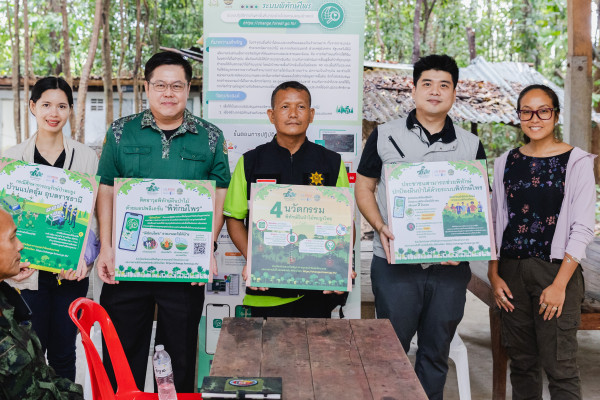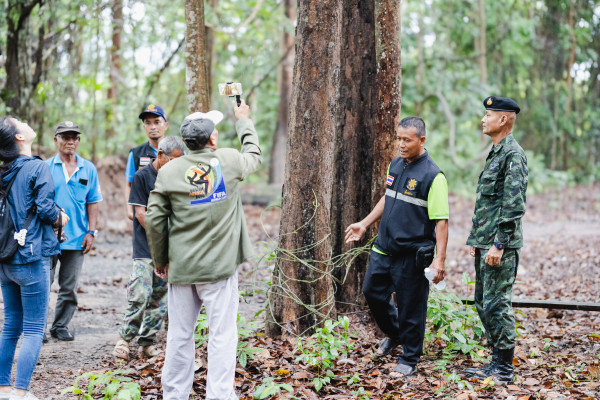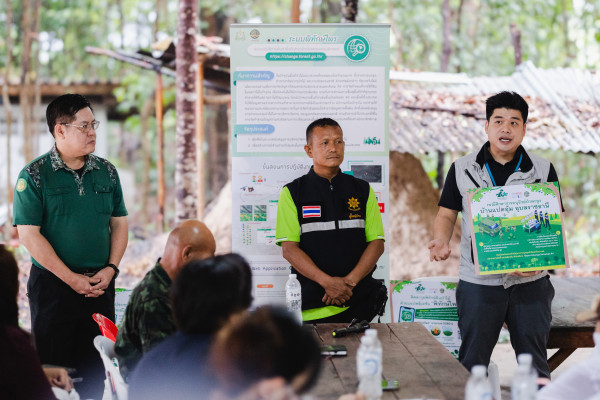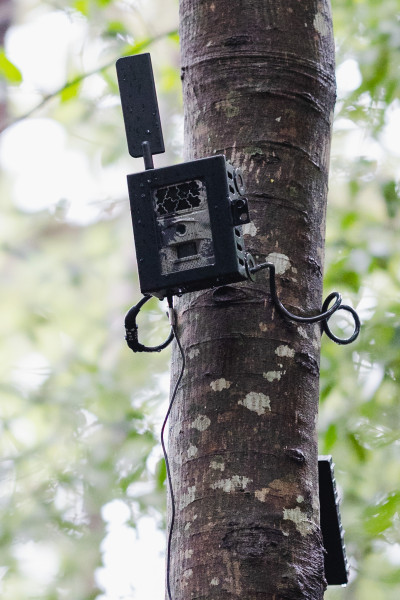Ban Pad Oom Community: a showcase of government-community cooperative efforts and the sustainable timber trade.

• Although statistics show that there has been a decline in timber imports from China, however, demand for wood-related products has increased from 70% to 90%.• Ban Pad Oom is a conservation area model where the community works closely with government agencies to effectively nurture the surrounding forest areas.• The Phitak Prai application, e-Tree platform, and NCAPs, are key technologies that are used for forest conservation.

Thailand, 22nd Jun 2023, King NewsWire – The Lower Mekong Region is on the brink of change. From originally being an area plagued with illegal logging and timber trade, to a new era where the community jointly coordinates with government agencies to protect the forest. It has been developed into a model area for forest conservation based on a sustainable timber trade concept.
Over the years, Thailand’s forests have always been a prime target for crime as most its forest composes of a wide variety of deciduous valuable trees that is in high demand. According to the United Nations Food and Agriculture Organization (FAO), the increasing timber trade to China plays a major role in illegal logging in the region even though statistics show a declining trend due to strict clampdowns of illegal logging and the fact that forest areas have been reduced to only one-third of what it originally was, the demand for wood and wood-related products continues to rise from 70% to a staggering 90%, thus imposing a huge pressure on forest conservation efforts within the region.
However, over the years, the FAO has partnered with the Royal Forest Department and other related government agencies to mitigate this illegal logging trend on a continuous basis and create an environment for sustainable timber trade by establishing Ban Pad Oom at Dome Pradit Sub-district, Nam Yuen District, Ubon Ratchathani Province, as a model project where the government and the community can cooperate in forest conservation efforts with a goal of moving towards sustainable timber trade.

Katrina Borromeo, the Programme and Communications Officer, for the United Nations Environment Program (UNEP), stated that Ban Pad Oom has been established as one of the interesting case studies in which the local community can cooperate closely with government agencies in preserving the surrounding forest areas and protect it from illegal deforestation. The model calls for the local community to act as volunteers in keeping a close eye on their forest environment in close cooperation with government officials. If any suspicious behavior or illegal loggers are detected, the villagers can immediately notify the authorities through various communication channels, as well as the Pitak Prai application.
Creating an understanding for the community to enable it to appreciate and cherish forest resources is one of the cooperative efforts between the community and related government agencies in protecting its forests. It allows the local community to be part of the mechanism to help monitor their home area while at the same time fostering relations with government officials and thus resulting in a concrete forest conservation collaboration.
Meanwhile, the Royal Forest Department Modern has simultaneously applied various technologies to help detect transgressors, such as the Pitak Prai application, the e-Tree registration system, as well as the NCAPS camera system, which assists in detecting suspects, including the use of drones to help in effectively patrolling the area. These actions have made it possible to detect and resolve illegal logging problems in a timely manner. These technologies have been utilized at Ban Pad Oom in Ubon Ratchathani province as a model that showcases the collaborative efforts between the local community and the public sector.

The Pitak Prai application is an application installed on a smartphone that can send alerts regarding illegal trespasses within suspected areas, in addition to, alerting and monitoring forest fires in a timely manner. Moreover, there is also an e-TREE digital platform that is aimed at enhancing the monitoring of forest management and assists in the registration and traceability of trees, which has proved very helpful in promoting sustainable timber trade.
On the other hand, NCAPs are remote systems that consist of cameras and sensors to monitor illegal logging in critical risk areas that work hand in hand with ground patrols, which can record and alert the authorities when suspicious movement is detected through the cameras. This reduces the risk of clashes between the local volunteers and suspected illegal loggers. Additionally, the cameras can also record images which can then be used as evidence in court proceedings. This capability has enabled the community to better monitor threats in the surrounding community’s forests, as well as reduce the risk of illegal logging and deforestation.

Ban Pad Oom is, therefore, a showcase model for forest conservation in which the community works in close cooperation with the related government agencies with the use of modern technology to effectively manage and maintain its forest areas. It is one of the forest conservation models that other communities can effectively adapt and use as a case study for their respective areas and countries.
After all, forest conservation is among one of UN-REDD’s activities to reduce greenhouse gas emissions resulting from deforestation and degradation, while also maintaining carbon levels in forest areas, including conservation and managing forests in a sustainable manner.

About UN-REDD
UN-REDD, is the United Nations Joint Program on reducing greenhouse gas emissions from deforestation and degradation in developing countries. It is among one of the key projects of the UN Knowledge and Advisory platform on forestry solutions in response to the climate change crisis.
About the UN Decade of Ecosystem Restoration
The UN Decade of Ecosystem Restoration 2021-2030, which is guided by the United Nations Environment Program (UNEP), the Food and Agriculture Organization of the United Nations (FAO), and its partners, covers work on terrestrial, as well as coastal and marine ecosystems, calls for global action, i.e. support from the government scientific research and financial support mechanisms, to enhance ecological restoration. Both the UN Decade of Ecosystem Restoration and UN-REDD have joined forces to lead the “Forest for Life” campaign.
Media Contact
Organization: Kith and Kin communication and consultant
Contact Person: Alex Chen
Website: https://kithandkin.com/
Email: sunthus@kithandkin.com
Country: Thailand
Release Id: 2206234270
